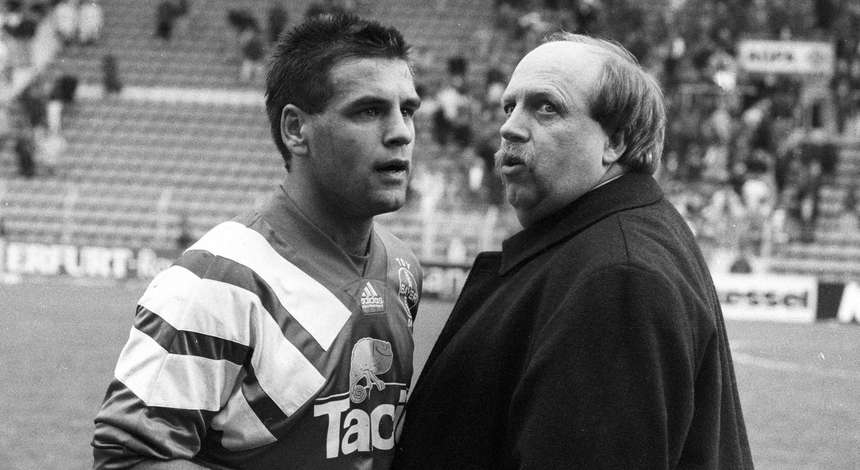
In part three of our series on 30 years of reunification, in an extensive interview, 'Calli' talks about happiness in Berlin, idyllic family holidays in Thuringia, an unusual matchwinner called Karnath and his close relationship with Chancellor Helmut Kohl.
Mr Calmund, what do you associate with the Day of German Unity?
I still remember well reunification on 3 October 1990, almost a year after the emotional fall of the Berlin Wall. We qualified for the Round of 16 in the UEFA Cup with a 1-1 draw at FC Twente Enschede and we celebrated German reunification into the early hours in Holland. It had a special meaning for Bayer 04 because we had two former GDR internationals in the team in Andreas Thom and Ulf Kirsten. Ulf Kirsten scored the winner in the home game and the crucial equaliser at 1-1 in Enschede.

How close is your personal, family relationship with East Germany?
My mother was born in Thuringia and I still have a close relationship to that state. It has a lot to offer: whether that's the Wartburg in Eisenach or the wonderful cities of Erfurt, Weimar and Gotha where I have an event with cult coach Hans Meyer and legendary reporter Werner Hansch at the hotel 'Der Lindenhof' on 29 October. Of course, probably with one of my favourite dishes: Thuringian potato dumplings with beef roulade and red cabbage.
Did you visit the GDR a lot before the fall of the Wall?
Before the Wall was built in August 1961, we had some great family summer holidays in Thuringia. Real water wells, over the yard to the loo, great cakes from the bakery, lovely relatives: Everything was just right. After the Wall was built, I was only allowed to travel to official sports events behind the Iron Curtain. I was in East Berlin four months before the Wall came down. We took our youth team to watch the DFB Cup final in the Olympic Stadium that Borussia Dortmund won 4-1 against Werder Bremen. Because all the hotels were booked out, we stayed in the Grand Hotel in East Berlin and that was very western and comfy at the time.
Where were you and what did you do on 9 November 1989?
I was at home and I couldn't believe the first news by phone about the fall of the Wall. Then I watched all the news and TV broadcasts on telly into the early hours.
How did you feel?
I had an incredible feeling of happiness and tears in my eyes. Two days after the fall of the Wall, I flew to Berlin as I wanted to be there to revive my old love for Berlin. The streets were full of people. It was all very emotional. I felt that something historic was happening there in Berlin. I was drawn to the Olympic Stadium. Hertha were scratching around in the bottom half of the second division and were always just on the edge of survival. On that day, the management were clearly presented as never before with the potential of professional football in that city.
What did you judge that on?
Hertha were playing Wattenscheid. At the Olympic Stadium. It was a top match but normally there are only a couple of thousand spectators in that huge bowl when Hertha were playing. On that evening 50,000 fans turned up. I invited ten East German citizens from the street into the hotel for an evening meal plus bed-and-breakfast. I want to know everything about their feelings and hopes. As with so many other people who came to Berlin in those days, weeks and months, I wanted to absorb history. Where else could you do that better than in the divided capital.
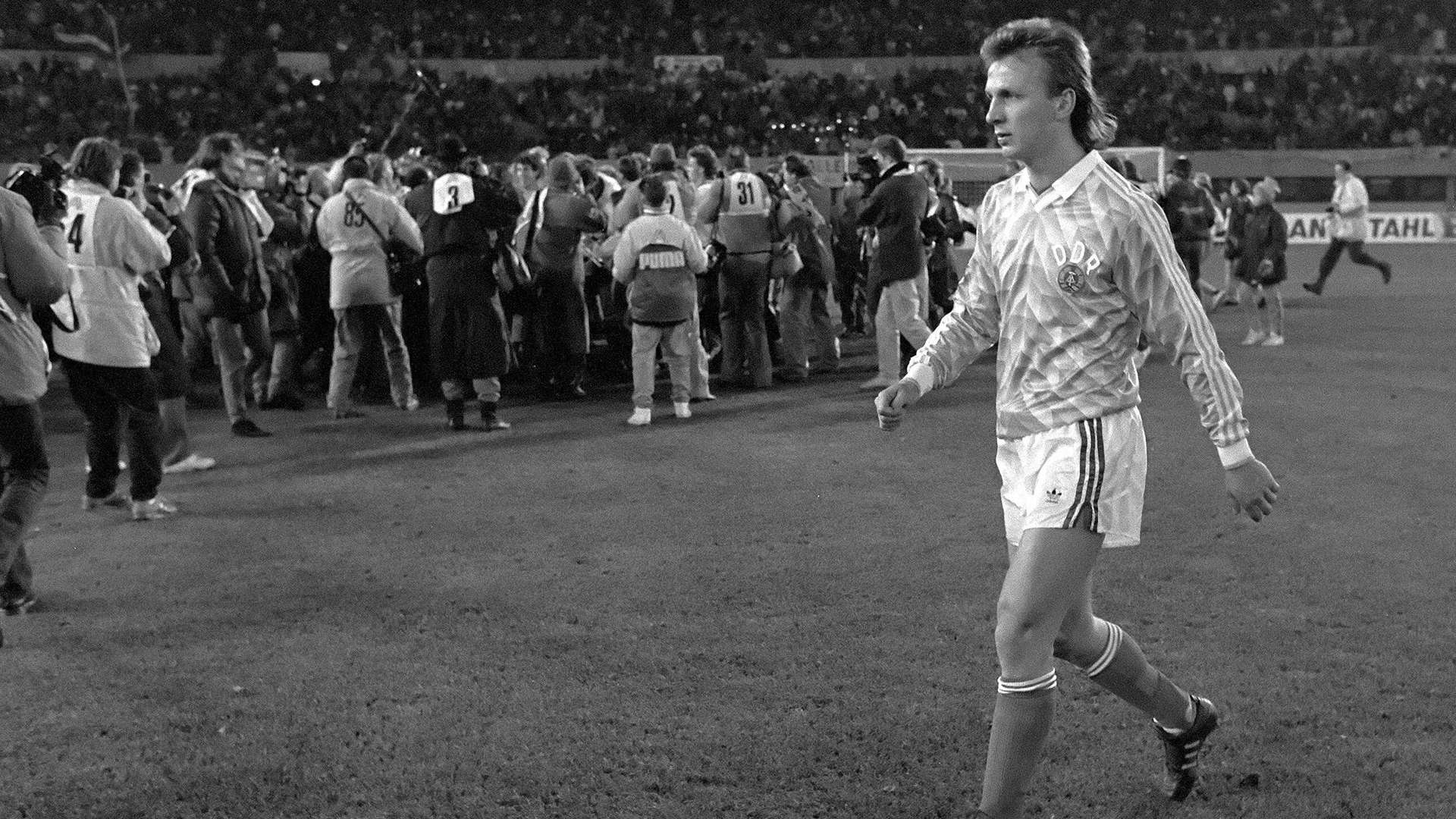
The World Cup qualifier between Austria and the GDR was played at the Prater Stadium in Vienna just six days after the fall of the Berlin Wall. For you that was the starting gun for an extended and exceptionally successful shopping expedition in the market for East German players. Your trick of getting through to the sought-after international players Andreas Thom and Ulf Kirsten even made it into the history books. Can you tell the story again briefly…
Officially, like all the other Bundesliga clubs, we sent our two most important scouts to the game: World Cup winner Dieter Herzog and the main 'spy' Norbert Ziegler. I had good contact with the Austrian Football Association and I managed to wangle a couple of additional photographers accreditations. Wolfgang Karnath, who worked for us in the youth section at the time, was our matchwinner positioning himself behind the GDR bench as an accredited photographer from the kick-off. As soon as the game ended, Karnath made contact with our targets Thom, Kirsten and Sammer and took down their addresses and contact details straightaway. That was the basis for our fast and successful discussions two days later.
How intensively did Bayer 04 look at the player market in the GDR before the fall of the Berlin Wall?
That was extremely limited as we didn't see any realistic chance of signing good GDR international players before the fall of the Wall. Because our scouting department had all the information from European club and international games, including youth matches, we were well aware of the GDR trio Andreas Thom, Ulf Kirsten and Matthias Sammer. Matthias Sammer won the European Championships with the GDR U18s in 1986 and a year later finished third at the World Cup in Chile with the U20s. At that youth tournament in Chile, the future world class players Robert Prosenecki, David Suker, Zvonimir Boban, Predrag Mijatović and Matthias Sammer were named as the top five. Ulf Kirsten was Player and Goalscorer of the Year in the GDR in 1990 and the year before Andreas Thom was top goalscorer and also Player of the Year. On top of that, Kirsten and Sammer were in the UEFA Cup semi-finals with Dynamo Dresden a year before the fall of the Wall.
What were your first impressions of Thom and Kirsten?
Both made a confident impression and also had a big portion of winning mentality thanks to their successes. And the same time, Andreas Thom was a bit more careful as he was the star at Dynamo Berlin, the favourite club of Stasi boss Erich Mielke.

What significance do the two transfers play in your career as a manager?
Ulf Kirsten became the Bundesliga goalscorer of the decade with us. He was our best signing over and above Völler, Schuster, Ballack, Schneider, Nowotny, Ramelow, Jorginho, Lucio, Ze Roberto, Emerson, Cha, Berbatov and Co. The most complete player was Andy Thom and normally he should have played for Real Madrid or Barcelona. He was and is a very likable man but he did lack a small portion of killer instinct. I'm very happy that I'm still very good friends with both of them.
Why were so many of the lads in the east so good? What made them stand them out?
The GDR and a lot of first class academies in the 80s with a lot of good full-time coaches. We could have only dreamt of that in the West. Only after the flop in the 2000 European Championships were all Bundesliga and second division clubs obliged to set up academies with a set staffing and physical infrastructure. Now the North East German Football Association with the state associations of Berlin, Saxony, Saxony-Anhalt, Thuringia, Mecklenburg-Vorpommern and Brandenburg have around 685,000 members and that's only 9.5% of the total 7.2 million DFB members. But at the 2002 World Cup, there were eight East German players in the World Cup squad and that was more than a third with Marko Rehmer, Thomas Linke, Jörg Böhme, Jens Jeremies, Carsten Jancker, Bernd Schneider, Michael Ballack and the injured Alexander Zickler.
After Thom and Kirsten, you later signed players like Matthias Stammann, Jens Melzig, Heiko Scholz, René Rydlewicz, Mike Rietpietsch, Mario Tolkmitt, then Stefan Beinlich, Bernd Schneider, Michael Ballack. There were times when no other professional German club had more East Germans in the squad than Bayer 04. That didn't go down well with everybody...
All the players were talented and did a good job for us. After the Berlin Wall came down, some people would have preferred to ban transfers of players from the East to the West. But that would have been inhuman and impossible to achieve legally. You couldn't replace the fall of the Berlin Wall by bringing in an invisible wall. The Bundesliga clubs had to say goodbye to a complete team before and after winning the World Cup in 1990 with Illgner (Real Madrid), Reuter, Kohler, Möller, Häßler (Juventus), Klinsmann, Brehme, Matthäus (Inter Milan), Littbarski (Paris and Japan), Berthold, Völler (AS Roma), Riedle (Lazio). And they definitely didn't all move on due to the nice weather in southern Europe but rather because of the money – which is also absolutely okay.

Edward Geyer, then the GDR coach, wrote in his biography it was like a slave market immediately after the last GDR International on 12 September 1990 with several agents behaving disgracefully. Can you understand that?
At the end of the day, the players decide when and to which club they want to go to. I can understand why Ede Geyer was unhappy – at the same time he moved on himself shortly after that as a youth coordinator at Schalke 04.
You had the contract with Matthias Sammer almost signed and sealed but were then unable to sign him for political reasons. Was there anybody else from East Germany who you would have liked to have signed but were unable to get?
No, Matthias Sammer was and remains the only case – even though it was very sad. He was ready to sign the contract. With him as the leader we would definitely have won one or the other trophy. His record: European champion, European Player of the Year, champion of Germany as a coach and a player, treble winner as sporting director at Bayer Munich etc says all you need to know.
Why didn't the transfer happen? What happened exactly?
Chancellor Helmut Kohl and I were both in Dresden at the same time. Two heavyweights, two opinions. What I didn't know: While I was completing the move to Leverkusen with Andreas Thom, Ulf Kirsten and Matthias Sammer, Kohl was meeting the top management of Bayer AG and reading the riot act out to the gentleman. For economic and political reasons, it could not be allowed for three current GDR internationals to move to one West German club so soon after the fall of the Wall: Imagine, so Kohl argued, the football fan. 'What effect would that have on the image of Bayer AG. You can't just buy out the GDR.'

The next day, Bayer AG let me know they were distancing themselves from the signing of the players Ulf Kirsten and Matthias Sammer. It was a nasty shock for me and I cursed my Chancellor who shared so much with me in addition to the weight. I then had a heavy heart with the transfer of Sammer to VfB Stuttgart where he went on to become a champion of Germany. It was also Matthias Sammer, as the youngest Bundesliga coach with Borussia Dortmund, who literally took the championship title from under our noses in 2002. Luckily we were able to complete the signing of Ulf Kirsten.

Related News
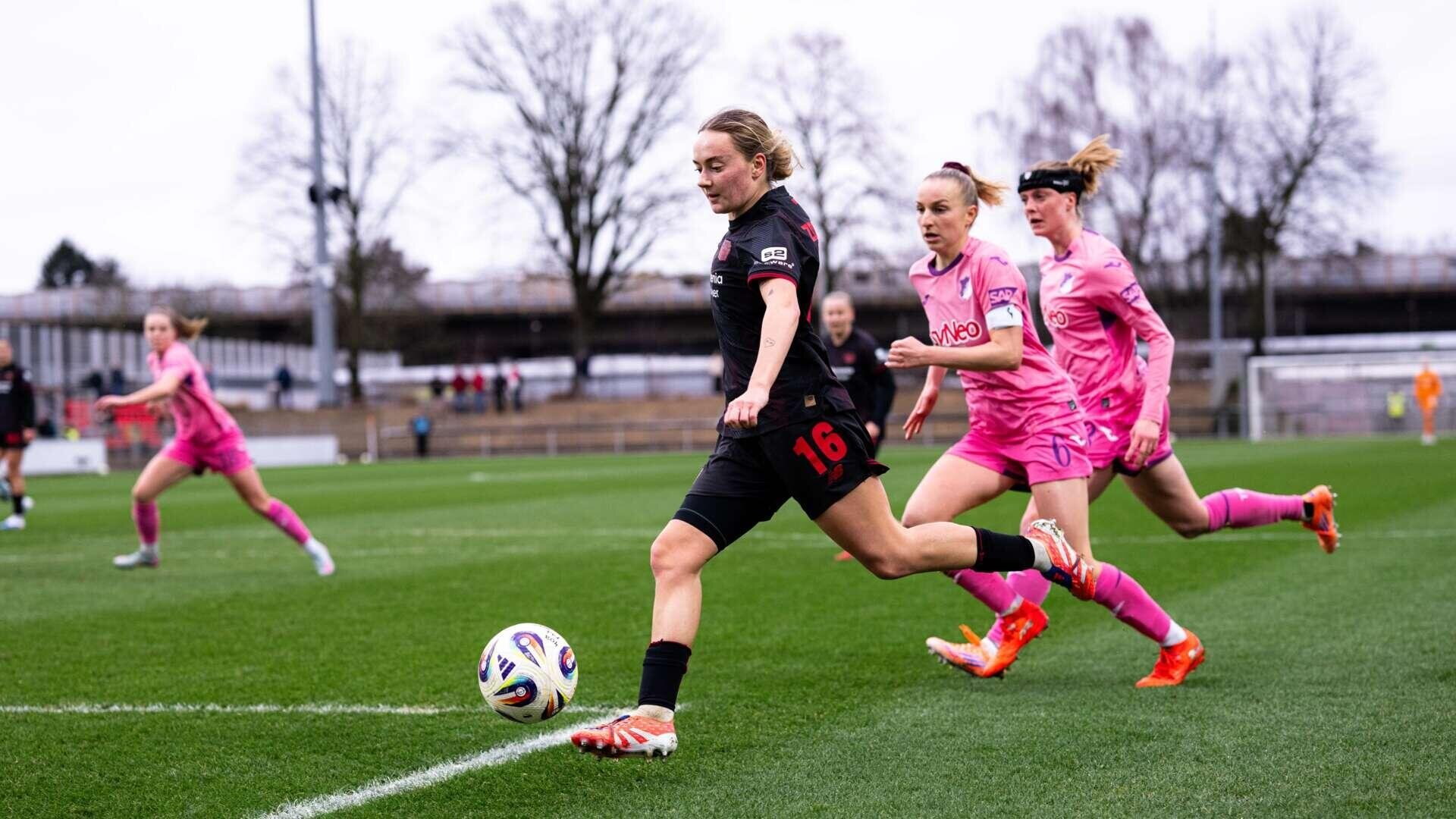
Women: TV-highlights of 0-1 loss against TSG Hoffenheim
Werkself-TV shows the highlights of the Bayer 04 women's 0-1 loss against TSG Hoffenheim on the 19th matchday of the Google Pixel Frauen-Bundesliga 2025/26.
Show more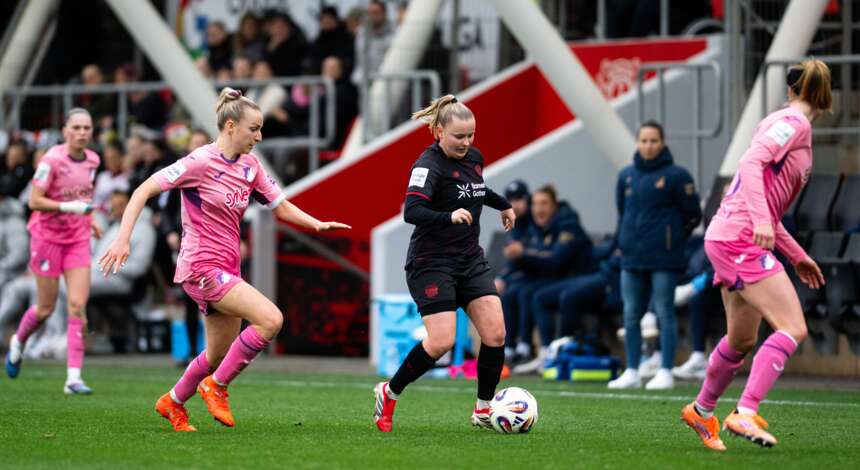
Bayer 04 Women lose 1-0 at home to Hoffenheim
The Bayer 04 Women suffered a setback in the race for third place in the Bundesliga table. Coach Roberto Pätzold's team lost 1-0 at home to direct rivals TSG Hoffenheim on Sunday afternoon, with a penalty after two minutes deciding the match. With 32 points and a game in hand, TSG have moved above the Werkself, who remain on 31 points. There is now a three-week international break before the remaining seven Bundesliga matches.
Show more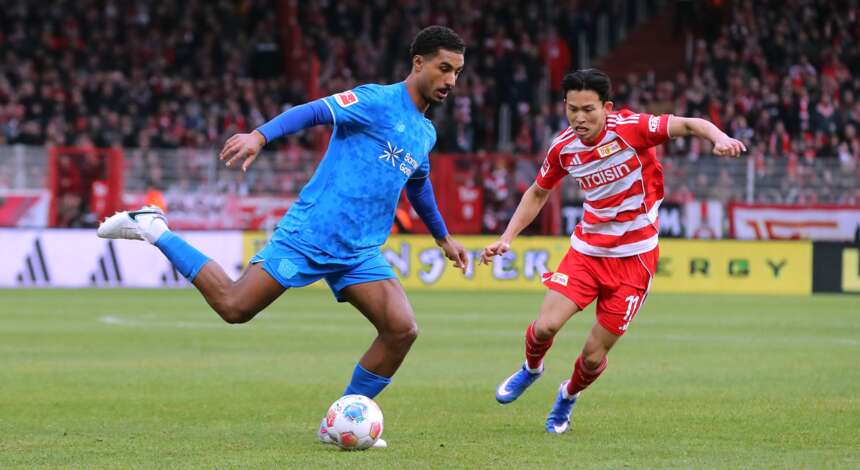
Muscle injury sidelines Bayer 04 defender Loïc Badé
Bayer 04 Leverkusen will have to manage without defender Loïc Badé for the time being. The Frenchman suffered a muscle injury in his right thigh in Saturday’s 1-0 Bundesliga defeat at FC Union Berlin. The diagnosis was the result of an MRI scan this Sunday morning.
Show more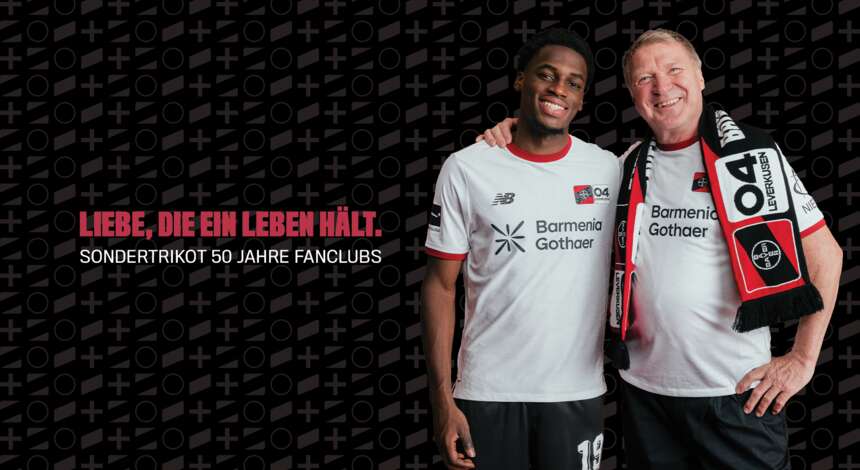
Love that lasts a lifetime. Bayer 04 present special edition jersey marking 50th anniversary of fan clubs Under the Cross
It is an expression of solidarity and a tribute to the unique fan culture Under the Cross: Bayer 04 Leverkusen make a special statement with the "50 Years of Fan Clubs" jersey. To mark the founding of the "First Fan Club 1976 Leverkusen", which was followed by many more over the years right up to the present day, the Bundesliga club is commemorating 50 years of passion with this new jersey. Highs and lows, successes celebrated together as well as defeats suffered are manifested in this piece of white fabric, a symbol of unwavering identification with the Werkself.
Show more